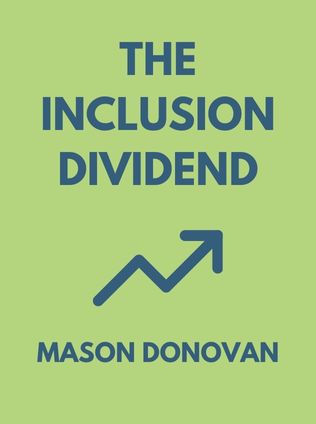
The Inclusion Dividend
Why Investing in Diversity & Inclusion Pays Off
By Mason Donovan,
Published 05/2013
About the Author
Mark Kaplan and Mason Donovan, the authors of "The Inclusion Dividend: Why Investing in Diversity & Inclusion Pays Off," are managing partners at The Dagoba Group, a consultancy specializing in leadership development, diversity and inclusion, and organizational change. Mark Kaplan, the former CEO of MGK Consulting, has been advising organizations on these topics since 1986. His extensive experience includes publication in leading diversity journals and speaking at global conferences. Mason Donovan has a rich background in consulting with Fortune 500 companies, focusing on talent acquisition, retention, and development. He is also the author of "DRIVEN: A Manager's Field Guide to Sales Team Optimization."
Main Idea
"The Inclusion Dividend" posits that diversity and inclusion (D&I) are not just ethical imperatives but essential components of a successful business strategy. The authors argue that a diverse and inclusive corporate culture leads to more productive, innovative, and engaged employees, better customer and client relationships, and ultimately, a stronger bottom line. The book provides a comprehensive framework for business leaders to foster an inclusive environment that leverages the full potential of their workforce.
Table of Contents
- Introduction
- Diversity? Inclusion? What Do We Mean?
- The Business Case for Inclusion
- Understanding Key D&I Concepts
- Framing a Sustainable Inclusion Initiative
- Unconscious and Unintentional Bias
- Insider-Outsider Dynamics
- Dimensions of Difference
- Critical Leadership Competencies
- Change Strategies for Creating Inclusion
Introduction
In the introduction of "The Inclusion Dividend," Kaplan and Donovan set the stage by explaining that the book is written for business leaders who aim to understand how their personal and corporate investment in inclusion can yield substantial returns. They emphasize that a strategic investment in creating a diverse and inclusive corporate culture always pays off, benefiting employees, teams, and the organization as a whole. The key takeaway is that diversity and inclusion are not mere ethical choices but are integral to achieving business success in today's global marketplace.
Diversity? Inclusion? What Do We Mean?
Kaplan and Donovan explore the definitions of diversity and inclusion, debunking the myth of meritocracy in corporate culture. They highlight that despite the aspiration for merit-based systems, biases and systemic barriers still exist, preventing true meritocracy. The authors define inclusion as a systemic aspiration that aims to include everyone, creating a climate where talent acquisition and management processes are inclusive and fair.
"In a true meritocracy, your gender would not dictate pay." - Mark Kaplan and Mason Donovan
To illustrate this, they ask why laws are necessary to ensure equal pay for women if meritocracy truly existed. The answer lies in the persistent biases and barriers that require focused efforts to create a more inclusive environment.
The Business Case for Inclusion
The authors make a compelling business case for inclusion by connecting it directly to organizational goals of reducing expenses and increasing revenues. They identify three key areas: talent management, talent acquisition, and marketplace engagement. These areas focus on attracting, retaining, and developing a diverse workforce, which in turn enhances productivity, innovation, and customer engagement.
Sign up for FREE and get access to 1,400+ books summaries.
You May Also Like
Rich Dad Poor Dad
What the Rich Teach Their Kids About Money - That the Poor and Middle Class Do Not!
By Robert T. KiyosakiFreakonomics
A Rogue Economist Explores the Hidden Side of Everything
By Steven D. Levitt and Stephen J. DubnerThe Lean Startup
How Today's Entrepreneurs Use Continuous Innovation to Create Radically Successful Businesses
By Eric RiesWho Moved My Cheese?
An Amazing Way to Deal with Change in Your Work and in Your Life
By Spencer Johnson, M.D.Factfulness
Ten Reasons We're Wrong About the World – and Why Things Are Better Than You Think
By Hans RoslingMake Your Bed
Little Things That Can Change Your Life...And Maybe the World
By William H. McRaven



















